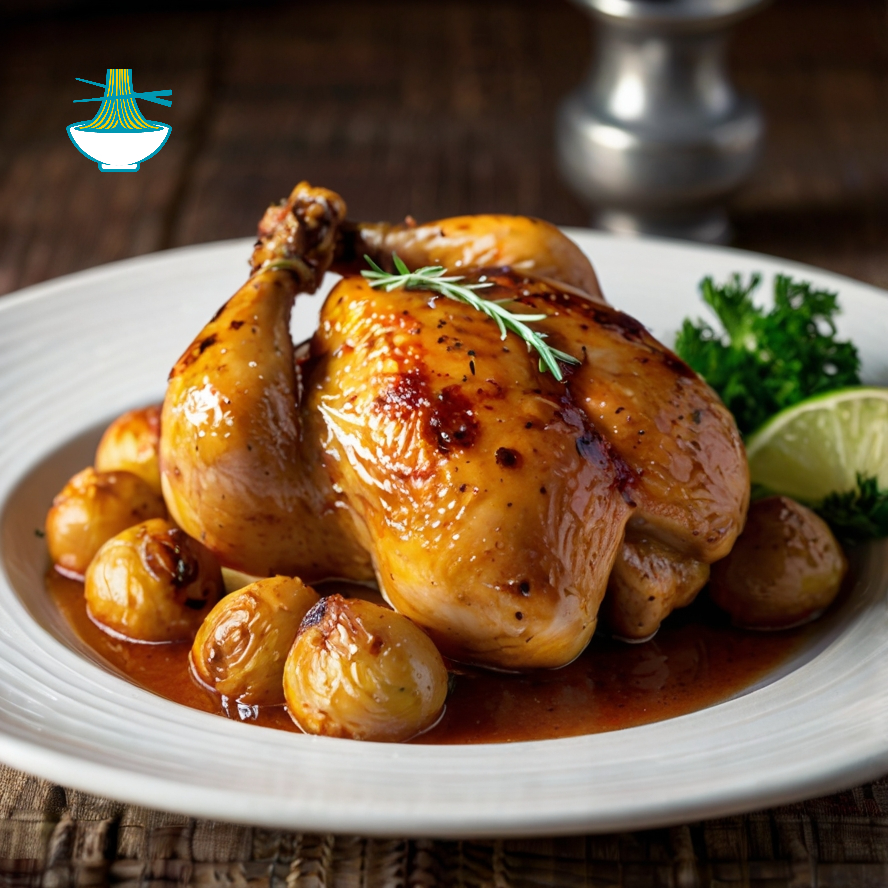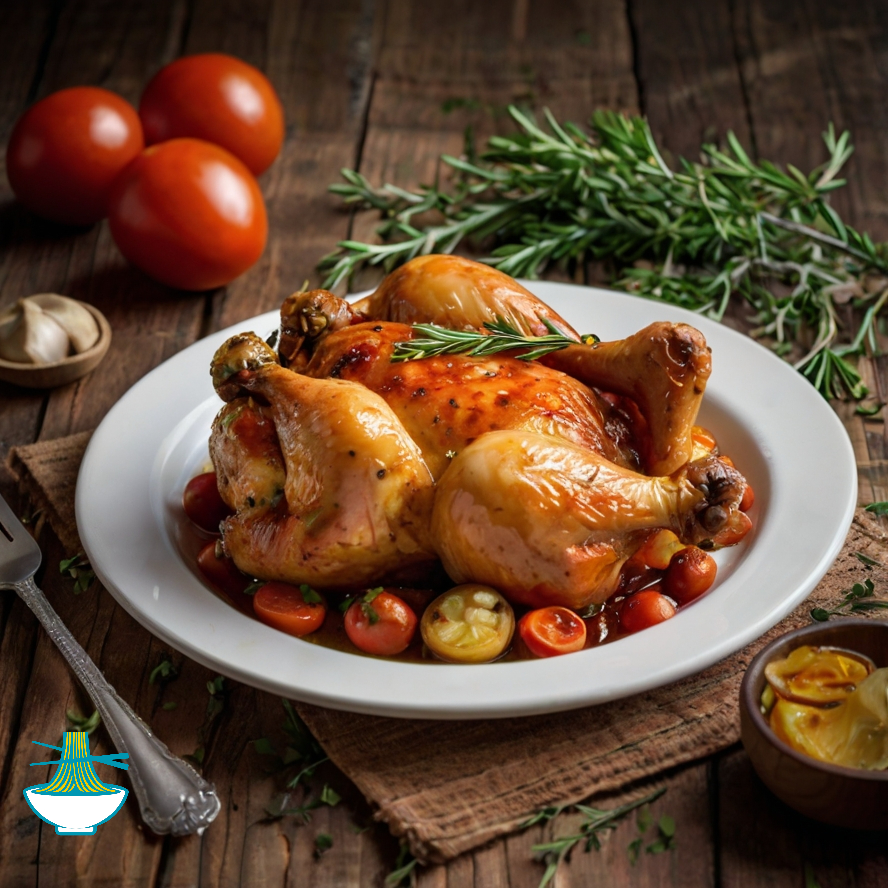Indulge in the flavorful delight of Pollo al Horno, a classic baked chicken dish infused with the aromatic essence of locally sourced herbs and spices. Discover the secrets to achieving tender, succulent chicken infused with rich flavors, perfect for a hearty family dinner or a festive gathering. Explore this easy-to-follow recipe and elevate your culinary repertoire with the tantalizing taste of traditional Pollo al Horno.
Ingredients:
- 1 whole chicken (about 3-4 lbs), cleaned and patted dry
- 2 tablespoons olive oil
- 2 cloves garlic, minced
- 1 teaspoon paprika
- 1 teaspoon dried oregano
- 1 teaspoon dried thyme
- 1 teaspoon ground cumin
- 1 teaspoon salt
- 1/2 teaspoon black pepper
- 1 lemon, sliced
- Fresh herbs (such as rosemary or parsley), for garnish (optional)
Instructions:
1-preheat your oven to 375°F (190°C).
2-In a small bowl, mix together the olive oil, minced garlic, paprika, oregano, thyme, cumin, salt, and black pepper to create a marinade.
3-Place the chicken in a roasting pan or baking dish. Rub the marinade all over the chicken, making sure to coat it evenly.
4-Stuff the cavity of the chicken with lemon slices for added flavor.
5-If desired, tie the legs of the chicken together with kitchen twine to help it cook evenly.
6-Place the chicken in the preheated oven and roast for about 1 hour to 1 hour 15 minutes, or until the chicken is cooked through and the juices run clear. You can check for doneness by inserting a meat thermometer into the thickest part of the chicken; it should register at least 165°F (75°C).
7-Once the chicken is cooked, remove it from the oven and let it rest for a few minutes before carving.
8-Garnish with fresh herbs, if desired, and serve hot.
Enjoy your delicious Pollo al Horno, infused with the aromatic flavors of local herbs and spices!
Nutritional Values :
Whole chicken (3-4 lbs):
- Calories: Approximately 1100-1400 kcal
- Protein: Approximately 120-160 grams
- Fat: Approximately 60-80 grams
- Carbohydrates: 0 grams
benefits:
- Excellent source of protein, essential for muscle repair and growth.
- Rich in vitamins and minerals such as B vitamins (particularly niacin and B12), which support energy production and neurological function, and selenium, which acts as an antioxidant.
- Provides phosphorus, which is crucial for bone health.
Olive oil (2 tablespoons):
- Calories: Approximately 240 kcal
- Fat: Approximately 28 grams
- No significant protein or carbohydrates
benefits:
- Rich in monounsaturated fats, which can help reduce the risk of heart disease by improving cholesterol levels.
- Contains antioxidants such as vitamin E and polyphenols, which have anti-inflammatory properties.
- May help in reducing the risk of certain chronic diseases due to its anti-inflammatory effects.
Garlic (2 cloves):
- Calories: Approximately 10 kcal
- Carbohydrates: Approximately 2 grams
- Negligible fat and protein
benefits:
- Contains compounds like allicin, which have been shown to have antibacterial, antiviral, and antifungal properties.
- May help lower cholesterol levels and blood pressure, potentially reducing the risk of heart disease.
- Contains antioxidants that can help protect against cell damage and aging.
Herbs and Spices (Paprika, Oregano, Thyme, Cumin):
Paprika (1 teaspoon):
- Calories: Approximately 6 kcal
- Carbohydrates: Approximately 1 gram
- Negligible fat and protein
Dried oregano (1 teaspoon):
- Calories: Approximately 5 kcal
- Carbohydrates: Approximately 1 gram
- Negligible fat and protein
Dried thyme (1 teaspoon):
- Calories: Approximately 3 kcal
- Carbohydrates: Approximately 1 gram
- Negligible fat and protein
Ground cumin (1 teaspoon):
- Calories: Approximately 8 kcal
- Carbohydrates: Approximately 1 gram
- Fat: Approximately 0.5 grams
- Protein: Approximately 0.5 grams
benefits for Herbs and Spices:
- Rich in antioxidants that help combat oxidative stress and inflammation in the body.
- Some herbs and spices have antimicrobial properties that can help fight infections.
- Provide flavor without adding extra calories, making them a great way to enhance the taste of dishes without relying on unhealthy ingredients like salt or sugar.
Salt (1 teaspoon):
- Calories: 0 kcal
- Sodium: Approximately 2300 mg
Black pepper (1/2 teaspoon):
- Calories: 0 kcal
- Negligible carbohydrates, fat, and protein
benefits
Salt
- Electrolyte Balance: Salt helps maintain the body's electrolyte balance, which is essential for nerve function and muscle contraction.
- Hydration: It plays a crucial role in maintaining hydration by regulating fluid balance in the body.
- Blood Pressure Regulation: In small amounts, salt is necessary for maintaining blood pressure. However, excessive consumption can lead to high blood pressure.
Pepper (Black Pepper)
- Rich in Antioxidants: Black pepper contains piperine, a compound with antioxidant properties that can help neutralize harmful free radicals in the body.
- Digestive Health: Piperine stimulates the production of digestive enzymes, which can aid in digestion and nutrient absorption.
- Anti-Inflammatory: Black pepper has anti-inflammatory properties that may help reduce inflammation in the body.
- Enhances Nutrient Absorption: Piperine in black pepper enhances the absorption of nutrients like vitamins and minerals, particularly curcumin from turmeric.
Lemon (1):
- Calories: Approximately 20 kcal
- Carbohydrates: Approximately 7 grams
- Negligible fat and protein
benefits:
- Excellent source of vitamin C, which is crucial for immune function and skin health.
- Contains flavonoids, which have antioxidant properties that help protect cells from damage caused by free radicals.
- Can aid digestion and promote hydration when added to water or dishes.
Please note that these values are approximate and can vary based on factors such as the specific brands of ingredients used and any variations in portion sizes.


Comments